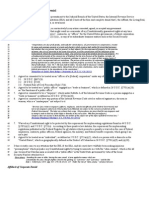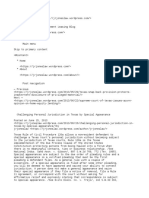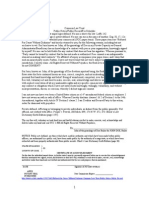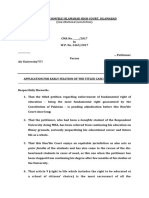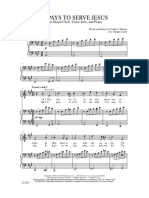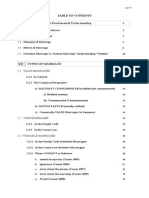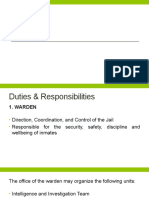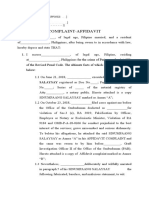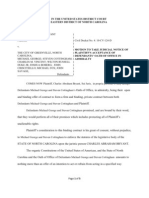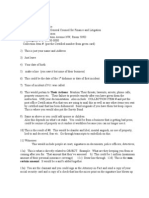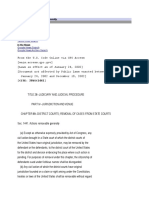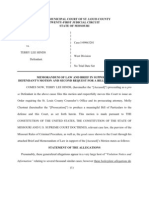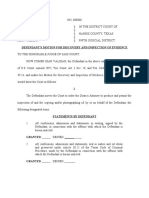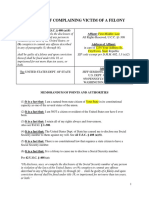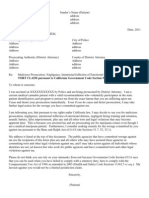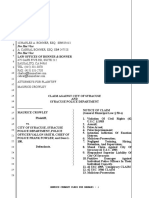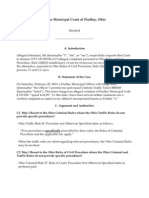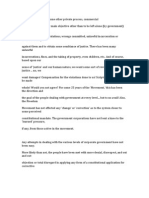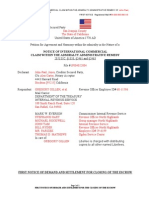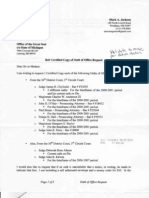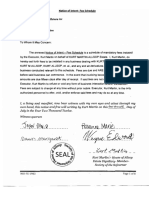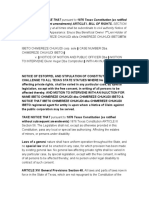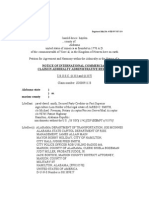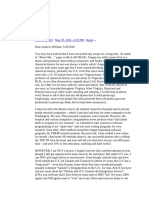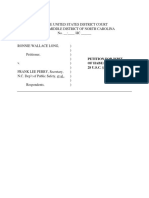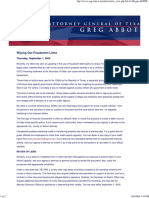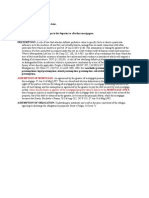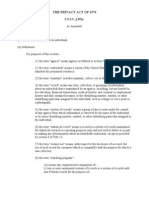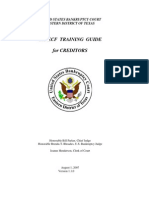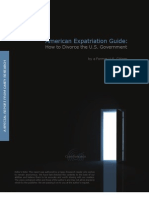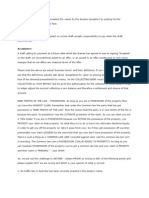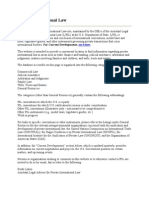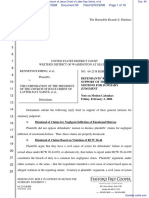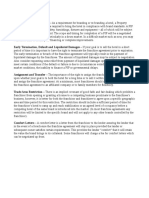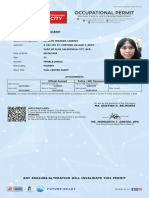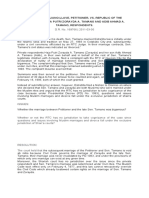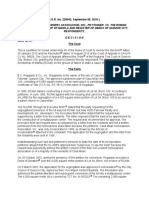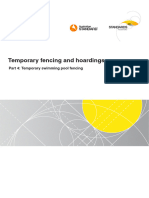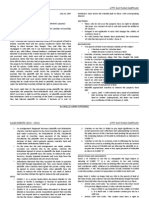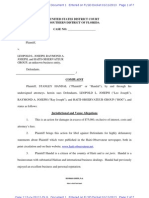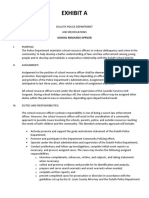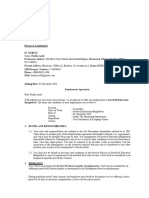Tort Claims
Tort Claims
Uploaded by
Rebel XCopyright:
Available Formats
Tort Claims
Tort Claims
Uploaded by
Rebel XOriginal Description:
Copyright
Available Formats
Share this document
Did you find this document useful?
Is this content inappropriate?
Copyright:
Available Formats
Tort Claims
Tort Claims
Uploaded by
Rebel XCopyright:
Available Formats
Guide to Judiciary Policy
Vol 20: Administrative Claims and Litigation
Ch 2: Federal Tort Claims
210 Overview 210.10 Purpose 210.20 Scope 210.30 Authority 210.40 Applicability 220 Tort Claim Procedure 220.10 Time Limit for Presenting Claim 220.20 Procedure for Claimant 220.30 Procedure for Officers and Employees 220.40 Settlement of Claim 220.50 Denial of Claim 220.60 Claims Involving Persons Other Than Federal Judiciary Officers and Employees 230 Suits Arising from Federal Tort Claims 230.10 Jurisdiction 230.20 Defendant 230.30 Administrative Claim Requirement 230.40 Time Limit 230.50 Maximum Dollar Demand 230.60 Money Damages Only 240 Suits Filed Against Employees Personally 240.10 Employee Responsibilities 240.20 Certification of Scope of Employment 240.30 Employees Petition for Certification 240.40 Suits Arising from Motor Vehicle Accidents 250 Claims by Car Rental Companies 250.10 Reporting Requirement 250.20 Waiver of Damage Charges 250.30 Identification of Rental as Official Business Rental 250.40 Damage Charged When Returning Car 260 Claims Not Covered by Federal Tort Claims Act 260.10 Limited Exclusions
Last substantive revision (Transmittal 20-002) June 15, 2011 Last revised (minor technical changes) May 31, 2012
Guide to Judiciary Policy, Vol. 20, Ch. 2
Page 2
260.20 Determination of Excluded Claims 270 Other Claims Arising from Accidents During Official Travel
210 Overview 210.10 Purpose This chapter states the procedures for presenting and resolving monetary claims for property damage, personal injury, or death alleged to have been caused by the negligence of officers and employees of the federal judiciary acting in the scope of their duties. 210.20 Scope The Federal Tort Claims Act provides the exclusive remedy for most monetary claims for property damage, personal injury, or death arising from the performance of official duties by federal officers and employees. These principally include claims arising from common-law torts, which are negligent or wrongful acts or omissions giving rise to liability to the injured person, as defined by the law of the State or locality where the event occurred. 210.30 Authority The Federal Tort Claims Act, 28 U.S.C. 1346(b), 2401(b), 2671-2680, and regulations of the Department of Justice at 28 CFR part 14. 210.40 Applicability The Director of the Administrative Office of the United States Courts (AO), or the Directors designee, applies the procedures in this chapter to consider and resolve monetary claims against the government for personal injury and property damage that the claimant alleges was caused by the negligence of one or more officers or employees of the federal judiciary acting in the scope of official duty. 220 Tort Claim Procedure 220.10 Time Limit for Presenting Claim A tort claim must be presented to the AO within two years of the date it accrued. See: 28 U.S.C. 2401(b).
Guide to Judiciary Policy, Vol. 20, Ch. 2
Page 3
220.20 Procedure for Claimant (a) The claimant must complete and sign a Standard Form 95 (Claim for Damage, Injury or Death), and submit it with all necessary documentation to the following address: Office of the General Counsel Administrative Office of the United States Courts One Columbus Circle, NE Washington, DC 20544 The claimant must: (1) (2) (3) (b) complete both pages (or sides) of the form, provide sufficient information to enable the AO to investigate and evaluate the claim, and state a dollar amount or sum certain that he or she will accept in full satisfaction of the claim.
When a tort claim alleges negligent or wrongful conduct by a probation officer in the course of performing parole supervision duties, the claim must be submitted to the United States Parole Commission rather than the AO.
220.30 Procedure for Officers and Employees Any officer or employee in the federal judiciary who receives a tort claim form (Standard Form 95 (Claim for Damage, Injury or Death)), any court document or correspondence presenting a monetary claim based on alleged official negligence, or any correspondence stating the intention to present such a claim, should transmit the documents immediately to the AO Office of the General Counsel. (a) As soon as possible, report the names and addresses of all known: (1) (2) (3) (4) claimants; attorneys; representatives or agents; insurance companies; and
Guide to Judiciary Policy, Vol. 20, Ch. 2
Page 4
(5) (b) (c)
witnesses.
Explain the relationship of each to the occurrence that gave rise to the tort claim. Provide copies of any accident reports, documentation of the named employees official duty status (e.g., driving on official business), statements by employees involved in the occurrence, statements by witnesses, and other pertinent documents that are available. Do not wait until the claim is complete to forward the information. Send the claimant's correspondence immediately with each piece of information that is available at the time, then send any additional information upon obtaining it. If necessary, contact the AO Office of the General Counsel for assistance in submitting the claim.
(d)
220.40 Settlement of Claim 220.40.10 Approval by Government A settlement offer must be approved by the Director of the Administrative Office or the Directors designee. A proposed settlement exceeding $25,000 must also be approved in writing by the Attorney General of the United States. See: 28 U.S.C. 2672. 220.40.20 Acceptance by Claimant To receive payment of a tort claim settlement, a claimant must complete, sign and return a written acceptance provided by the AO (either a Form FMS-197, Judgment Fund Voucher for Payment for payments over $2,500, or a substantially equivalent acceptance for smaller payments). When a claimant accepts a tort claim settlement, the settlement is final and conclusive, and releases both the government and the employee from further liability based on the same tortious conduct. See: 28 U.S.C. 2672. 220.40.30 Payment of Claim Payments exceeding $2,500 are disbursed by the Financial Management Service, Department of the Treasury; payments of $2,500 or less are disbursed by the AO. See: 28 U.S.C. 2672. The AO or the Treasury can only issue one payment to the claimant. 220.50 Denial of Claim When the AO denies payment of a claim, the AO will send the claimant a written notice of denial in accordance with the Department of Justice regulations at 28 CFR part 14.
Guide to Judiciary Policy, Vol. 20, Ch. 2
Page 5
The claimant may then file suit against the government in United States district court within six months of the date of mailing of the denial notice. See: 28 U.S.C. 1346(b), 2401(b); Guide, Vol 20, 230. 220.60 Claims Involving Persons Other Than Federal Judiciary Officers and Employees Some claims are based entirely or in part on alleged negligence or wrongful conduct by state officials (judges, sheriffs, police, state prison officers), private persons (e.g., attorneys, bankruptcy trustees, claimants relatives or acquaintances), employees of federal contractors, or federal officials outside the judiciary (e.g., United States attorney, United States marshal, Bureau of Prisons, FBI or IRS agents). (1) (2) Contact the AO Office of the General Counsel for assistance in forwarding the claim to the appropriate place. If a claim names federal court officials as well as other persons, transmit a copy of the claim to the AO Office of the General Counsel. The AO and other federal entities will coordinate disposition of the claim as necessary.
230 Suits Arising from Federal Tort Claims 230.10 Jurisdiction The United States district courts and the District Court of the Virgin Islands have exclusive jurisdiction of actions arising from federal tort claims. See: 28 U.S.C. 1346(b). 230.20 Defendant The United States is the sole defendant in a suit arising from a federal tort claim. See: 28 U.S.C. 2679. 230.30 Administrative Claim Requirement (a) No civil action may be instituted on a claim covered by the Federal Tort Claims Act unless the claimant has first timely submitted an administrative claim to the AO and: (1) the AO has finally denied the claim in a written notice in accordance with 28 CFR part 14, or
Guide to Judiciary Policy, Vol. 20, Ch. 2
Page 6
(2) (b)
the claim has not been resolved (either settled or denied) within six (6) months of submission.
If the claimant has not pursued an administrative tort claim as provided in paragraph (a) of this section before filing a tort suit against the federal government or a federal employee, the suit must be dismissed. See: 28 U.S.C. 2675(a).
230.40 Time Limit If the AO has sent a written notice of denial, the claimant has six months after the date the notice was mailed to file suit. After six months, the suit is time-barred. See: Guide, Vol 20, 220.50. 230.50 Maximum Dollar Demand The claimant's demand for damages in the suit may not exceed the dollar amount demanded in the administrative claim, in the absence of new evidence. See: 28 U.S.C. 2675(b). 230.60 Money Damages Only The Federal Tort Claims Act permits only claims for money damages, not for other forms of relief. See: 28 U.S.C. 2672. 240 Suits Against Employees Personally When a claim falls within the scope of the Federal Tort Claims Act, the employee may not be sued personally for money damages unless the claim also arises from: (a) (b) an alleged violation of the claimant's constitutional rights (a Bivens claim), or an alleged violation of a federal statute expressly authorizing suit against the employee. See: 28 U.S.C. 2679(b). At the most recent review of this material, there were no statutes authorizing personal suits against Judicial Branch employees.
240.10 Employee Responsibilities An officer or employee of the federal judiciary who receives process or otherwise learns that he or she is named as a defendant in a suit seeking money damages based on the performance of official duties should:
Guide to Judiciary Policy, Vol. 20, Ch. 2
Page 7
(a) (b)
immediately notify the United States attorney and the AO Office of the General Counsel, and be prepared to provide copies of the process (or other documents that the employee received) to the United States attorney and AO Office of the General Counsel, and furnish sufficient information to permit a finding that the suit arises from the performance of official duties.
240.20 Certification of Scope of Employment The Attorney General defends all suits filed against federal employees that arise from negligence within the scope of employment. When a suit for money damages is filed against an employee alleging tortious conduct, the Attorney General will determine whether the defendant employee was acting within the scope of his or her office or employment at the time of the conduct. (a) If the Attorney General certifies that the employee was acting within the scope of office or employment, the United States will be substituted as defendant in lieu of the employee. 28 U.S.C. 2679(d)(1). If the suit was filed in state court, the United States attorney will also remove the suit to United States district court. 28 U.S.C. 2679(d)(2). If the Attorney General refuses to certify that an employee was acting within the scope of office or employment, the employee may petition the court to make such a certification. See: 240.30 (Employees Petition for Certification).
(b)
240.30 Employees Petition for Certification If the Attorney General has refused to certify that the employee was acting within the scope of employment, the employee may petition the court in which the suit is pending at any time before trial to make such a certification. 28 U.S.C. 2679(d)(3). (a) If the suit is pending in a state court when the employee files the petition, the Attorney General may remove the suit to the United States district court. If the court makes the certification, the case is deemed to be a federal tort suit filed against the government. 28 U.S.C. 2679(d)(4). If a United States district court finds that the employee was not acting within the scope of employment, the suit is remanded to the state court.
(b) (c)
Guide to Judiciary Policy, Vol. 20, Ch. 2
Page 8
240.40 Suits Arising from Motor Vehicle Accidents A claimant will often file a personal suit against a government driver soon after a motor vehicle accident, because the statutes of limitations on automotive claims in many jurisdictions are relatively short. The suit is usually filed in a local court without regard to the requirements of the Federal Tort Claims Act. It is especially important to notify the United States attorney and the AO Office of the General Counsel when this happens, so that the suit can be removed from state court and, if appropriate, dismissed pending submission of an administrative tort claim. 250 Damage Claims by Car Rental Companies 250.10 Reporting Requirement The government driver must report an accident involving a commercially rented vehicle to the rental company in accordance with the rental contract and to local police as required by law. 250.20 Waiver of Damage Charges (a) In general, neither the government nor the employee is liable for damage to a rented vehicle that occurs during authorized official use within the continental United States, when the rental is identified as an official business rental. Most commercial car rental companies in the continental United States participate in the U.S. Government Car Rental Agreement, under which the company waives all charges for accidental damage to its vehicle during a rental for official government business. Staff at local car rental outlets may not be aware of the damage waiver under the U.S. Government Car Rental Agreement. Therefore, before signing the rental contract, the employee should be sure to inform the representative at the rental outlet, and be sure that the contract identifies the rental as official government business. This will help to protect the employee from personal charges for accidental damage.
(b)
250.30 Identification of Official Business Rental The use of a government credit card or presentation of a travel authorization is sufficient to identify the rental as an official business rental; however, the employee should also be sure to mention it specifically to the rental agent before signing for the car.
Guide to Judiciary Policy, Vol. 20, Ch. 2
Page 9
250.40 Damage for Which the Government May Be Liable If the rental is not covered by the U.S. Government Car Rental Agreement, the employees office or agency pays for damage to the car. The government credit card may also offer some collision damage benefits covering part or all of the damage charges. 250.50 Damage Charged When Returning Car If the employee is charged for damage when returning the car, or damage charges later appear on a personal or government credit card, the employee should submit all available information concerning the charges to the Office of the General Counsel for a determination whether reimbursement by the employing office, or cancellation of the charges by the rental company, is appropriate. 260 Claims Excluded from Federal Tort Claims Act Certain claims are specifically excluded from the Federal Tort Claims Act and cannot be settled under that statute. (a) Claims alleging violations of Constitutional rights (so-called Bivens claims) that do not also amount to common-law torts, and claims that are actionable under other statutes. See: 28 U.S.C. 2679(b)(2). Claims based on negligent or wrongful conduct of federal officers and employees acting outside the scope of employment. See: 28 U.S.C. 2672. Claims based on negligent or wrongful conduct of government contractors or their employees. See: 28 U.S.C. 2671. Claims based on the performance of professional services by an officer or employee of a federal public defender organization in providing representation under the Criminal Justice Act (18 U.S.C. 3006A). See: 28 U.S.C. 2671. Claims for a remedy other than monetary compensation (e.g., issuance or reversal of a court ruling, return of property, release from prison, appointment of legal counsel) . See: 28 U.S.C. 2672.
(b)
(c) (d)
(e)
Guide to Judiciary Policy, Vol. 20, Ch. 2
Page 10
260.10 Limited Exclusions Under 28 U.S.C. 2680(h), the following types of claims, generally considered intentional torts, are not subject to the Federal Tort Claims Act unless the allegation involves an "investigative or law enforcement officer of the United States," a category which has been held to include United States probation officers: assault battery false imprisonment false arrest abuse of process, or malicious prosecution.
260.20 Determination of Excluded Claims Submit all claims to the AO Office of the General Counsel for a determination whether they are appropriate for consideration under the Federal Tort Claims Act. 270 Other Claims Arising from Accidents During Official Travel In addition to Federal Tort Claims for property damage or injury to another driver, the following claims may arise during official travel: 270 Other Claims Arising from Accidents During Official Travel
Nature of Claim (a) Injury to Federal Employee Remedy Federal Employees Compensation Act. See: Workers Compensation page on the J-Net. Court or agency pays repair costs. Send Claim To: Your District Office of Workers Compensation Programs (U. S. Dept. of Labor). See: Dept. of Labor links on Workers Compensation page on the J-Net. GSA will either bill the court or agency or advise the court or agency to obtain the repairs directly, depending on local GSA fleet outlets practice. If another identifiable person was at fault, the court unit or agency should provide all available information to GSA and ask them to attempt recovery from the person at fault. GSA will reimburse the court or agency, if successful.
(b) Damage to GSA Fleet Vehicle
Guide to Judiciary Policy, Vol. 20, Ch. 2
Page 11
270 Other Claims Arising from Accidents During Official Travel
Nature of Claim (c) Damage to Commercial Rental Vehicle Remedy See: 250, above. Usually, neither the employee nor the court or agency is liable for the damage. Send Claim To: If the rental company charges or proposes charging your credit card or the court, contact the rental agent and advise them of the damage waiver for official rentals under Section 18(b) of the U.S. Government Car Rental Agreement or Truck Rental Agreement 1, at http://www.defensetravel.dod.mil/site/reference. cfm#U. If your credit card has already been charged, challenge it. If necessary, contact the Office of the General Counsel, Administrative Office of the U.S. Courts, Washington, DC 20544, for assistance in resolving the matter. Office of the General Counsel, Administrative Office of the U.S. Courts, Washington, DC 20544.
(d) Damage to Employees Own Vehicle
Employees or other drivers auto insurance policy. If employee was not at fault, employee may recover deductible co-payment up to $500 from the AO. See: Guide, Vol 20, Ch 4 (Employees Personal Property Claims).
You might also like
- Jonah Bey Injunction TemplateDocument9 pagesJonah Bey Injunction TemplateArtie tyreck Bey92% (12)
- How 2 Setup TrustDocument3 pagesHow 2 Setup TrustRebel X97% (290)
- Injunction TemplateDocument7 pagesInjunction TemplateJeromeKmt100% (16)
- Affidavit of Corporate DenialDocument9 pagesAffidavit of Corporate DenialHOPE6582% (11)
- GSA-Optional Form 91Document1 pageGSA-Optional Form 91Benne James100% (6)
- Motions, Affidavits, Answers, and Commercial Liens - The Book of Effective Sample DocumentsFrom EverandMotions, Affidavits, Answers, and Commercial Liens - The Book of Effective Sample DocumentsRating: 4.5 out of 5 stars4.5/5 (17)
- SSN and BC TrustsDocument4 pagesSSN and BC TrustsRebel X100% (18)
- Abate Traffic Ticket or Fed Charge SummonsDocument61 pagesAbate Traffic Ticket or Fed Charge SummonsDex Mail100% (11)
- Affidavit of AbatementDocument4 pagesAffidavit of Abatementjoe93% (15)
- Legal Notice and DemandDocument28 pagesLegal Notice and DemandMsDiamondTraxx95% (21)
- Challenging Personal Jurisdiction in Texas by Special AppearanceDocument5 pagesChallenging Personal Jurisdiction in Texas by Special Appearancejoe100% (1)
- (David Horowitz) Black Skin Privilege and The AmerDocument18 pages(David Horowitz) Black Skin Privilege and The AmerRoger ShahNo ratings yet
- Anti-SLAPP Law Modernized: The Uniform Public Expression Protection ActFrom EverandAnti-SLAPP Law Modernized: The Uniform Public Expression Protection ActNo ratings yet
- Common Law Trust Refused For Cause Without Dishonor Public Notice/PublicDocument1 pageCommon Law Trust Refused For Cause Without Dishonor Public Notice/Publicin1or100% (4)
- Application For Early HearingDocument2 pagesApplication For Early HearingMinhas Sandhu50% (2)
- It Pays To Serve JesusDocument4 pagesIt Pays To Serve JesusKofi Kwansa HolmanNo ratings yet
- Marriage Paper PDFDocument37 pagesMarriage Paper PDFmcris101100% (1)
- 5 - BJMP Duties and ResponsibilitiesDocument15 pages5 - BJMP Duties and ResponsibilitiesJovie Masongsong67% (3)
- Affidavit Complaint-Perjury SampleDocument4 pagesAffidavit Complaint-Perjury SampleDaniel Besina Jr.100% (1)
- Denial of Corporate Existance 23642556-Affidavit-2Document9 pagesDenial of Corporate Existance 23642556-Affidavit-2Cheeseman3749100% (4)
- Acceptance of Oath of OfficeDocument5 pagesAcceptance of Oath of Officeabrhmx6446100% (2)
- Filling Out The Tort ClaimDocument2 pagesFilling Out The Tort ClaimMalcolm Walker100% (1)
- 28USC1441 Removal To Federal CourtDocument7 pages28USC1441 Removal To Federal CourtWen' George Bey100% (1)
- 24 - Bill of Particulars - Memorandum of Law and Brief in Support ofDocument56 pages24 - Bill of Particulars - Memorandum of Law and Brief in Support ofterryhinds0% (1)
- Basic Motion For Discovery-2Document9 pagesBasic Motion For Discovery-2Ghetto Vader100% (2)
- Declaration and Notice of Expatriation TexasDocument3 pagesDeclaration and Notice of Expatriation TexasDavid Jeremiah IINo ratings yet
- Affidavit of A Felony TemplateDocument2 pagesAffidavit of A Felony TemplateJeromeKmt100% (5)
- Sample Tort Claim Letter Bane RalphDocument1 pageSample Tort Claim Letter Bane RalphRichard BrumfieldNo ratings yet
- Bill of Complaint PDF - PDF - Trust Law - Equity (Law)Document27 pagesBill of Complaint PDF - PDF - Trust Law - Equity (Law)ChanelNo ratings yet
- A Notice of Distress GenericDocument8 pagesA Notice of Distress GenericCool1100% (3)
- Judicial Notice & AffidavitDocument4 pagesJudicial Notice & Affidavitjupiterskye86% (7)
- Maurice Crawley Notice of Claim Against Syracuse PoliceDocument18 pagesMaurice Crawley Notice of Claim Against Syracuse PoliceDouglass Dowty100% (2)
- Motion To Dismiss - No Service of ProcessDocument7 pagesMotion To Dismiss - No Service of Processdattwing100% (1)
- How To Go After Bonds of OfficialsDocument9 pagesHow To Go After Bonds of OfficialsStephen Stewart91% (23)
- Secured Transactions: UCC Title 9Document17 pagesSecured Transactions: UCC Title 9Rebel X88% (8)
- Overview of Admiralty Maritime Law March 15 2004 Jean KeatingDocument18 pagesOverview of Admiralty Maritime Law March 15 2004 Jean KeatingHenoAlambre100% (16)
- The Constitutional Case for Religious Exemptions from Federal Vaccine MandatesFrom EverandThe Constitutional Case for Religious Exemptions from Federal Vaccine MandatesNo ratings yet
- Tort Claim FormDocument3 pagesTort Claim FormJohnGarza100% (1)
- Payment Bond: (See Instructions On Reverse)Document2 pagesPayment Bond: (See Instructions On Reverse)Autochthon Gazette100% (1)
- Tort Claim ProccessDocument147 pagesTort Claim ProccessDUTCH55140092% (13)
- 5 1st Notice of DemandDocument3 pages5 1st Notice of DemandKristin Cantley Snell100% (1)
- Notice of RemovalDocument4 pagesNotice of RemovalBan100% (2)
- Certified MailDocument2 pagesCertified MailKNOWLEDGE SOURCENo ratings yet
- Federal Tort Claims ActDocument12 pagesFederal Tort Claims ActDevaughn Immanuel Corrica-El100% (1)
- Oaths of OfficeDocument9 pagesOaths of OfficeMark Jackson100% (1)
- House of Allsop Fee Schedule CompleteDocument11 pagesHouse of Allsop Fee Schedule CompleteMasterNo ratings yet
- Public Servant Questionnaire, Adapted by Bob HurtDocument3 pagesPublic Servant Questionnaire, Adapted by Bob Hurtapi-26143108100% (4)
- Fee Schedule PublicDocument17 pagesFee Schedule PublicTori KleinNo ratings yet
- Injuction Texas ChanteDocument8 pagesInjuction Texas ChanteTyneshaNo ratings yet
- Notice of ClaimDocument6 pagesNotice of ClaimScott Atkinson100% (3)
- Affidavit of HeirshipDocument2 pagesAffidavit of HeirshipKhay Ann Dula100% (1)
- Bonding of Public OfficialsDocument2 pagesBonding of Public OfficialsNotarysTo Go100% (3)
- Certificate of Foreign Status of Beneficial Owner For United States Tax WithholdingDocument1 pageCertificate of Foreign Status of Beneficial Owner For United States Tax WithholdingMichelle OsbornNo ratings yet
- Breach of Fiduciary Duty ClaimsDocument21 pagesBreach of Fiduciary Duty ClaimsTruth Press Media100% (5)
- Notice of International Commercial Claim in Admiralty Administrative RemedyDocument35 pagesNotice of International Commercial Claim in Admiralty Administrative Remedyrhouse_1100% (4)
- Commerical LienDocument8 pagesCommerical LienJohn Ox100% (1)
- Writ of Discovery Courts 7 Qusestions - TKDocument1 pageWrit of Discovery Courts 7 Qusestions - TKnatural devine movementsNo ratings yet
- Motion For Mandatory Judicial NoticeDocument2 pagesMotion For Mandatory Judicial NoticeGreg Wilder100% (1)
- LawsuitDocument14 pagesLawsuitJordan Claire100% (1)
- Tort Claim Filed Against Jones CountyDocument40 pagesTort Claim Filed Against Jones CountyCopBlock100% (3)
- Petition For Writ of Habeas CorpusDocument82 pagesPetition For Writ of Habeas CorpusAshLeigh Long100% (2)
- Deprivation of Rights Under Color of LawDocument1 pageDeprivation of Rights Under Color of LawDMDONo ratings yet
- GSA LetterDocument4 pagesGSA LetterAustin Denean100% (1)
- Wiping Out Fraudulent LiensDocument2 pagesWiping Out Fraudulent LiensAnonymous EKGJIpGwPjNo ratings yet
- Affidavit of FactsDocument3 pagesAffidavit of FactsNativeAmericanMoorsNo ratings yet
- SF273 13cDocument2 pagesSF273 13cAutochthon Gazette100% (2)
- Petition for Certiorari – Patent Case 94-782 - Federal Rule of Civil Procedure 12(h)(3) - Patent Statute 35 USC 261 – Judgment lien Statute 12 USC 1963From EverandPetition for Certiorari – Patent Case 94-782 - Federal Rule of Civil Procedure 12(h)(3) - Patent Statute 35 USC 261 – Judgment lien Statute 12 USC 1963Rating: 5 out of 5 stars5/5 (2)
- Constitution of the State of Minnesota — 1964 VersionFrom EverandConstitution of the State of Minnesota — 1964 VersionNo ratings yet
- Traffic Tickets. Don't Get Mad. Get Them Dismissed. Stories From The Streets.From EverandTraffic Tickets. Don't Get Mad. Get Them Dismissed. Stories From The Streets.Rating: 4 out of 5 stars4/5 (1)
- Law of Persons NotesDocument8 pagesLaw of Persons NotesRebel XNo ratings yet
- Mortgage Lending PracticesDocument2 pagesMortgage Lending PracticesRebel XNo ratings yet
- Maxims of Islamic LawDocument3 pagesMaxims of Islamic LawRebel XNo ratings yet
- CapacityDocument5 pagesCapacityRebel X100% (1)
- Remedies in RightsDocument6 pagesRemedies in RightsRebel X100% (1)
- Sahih Muslim English TranslationDocument1,850 pagesSahih Muslim English Translationnounou0018100% (3)
- Key Statements in LawDocument1 pageKey Statements in LawRebel XNo ratings yet
- Part VII - Esoteric KnowledgeDocument7 pagesPart VII - Esoteric KnowledgeRebel X100% (1)
- Privacy Act of 1974Document20 pagesPrivacy Act of 1974Rebel X100% (2)
- CM Creditor Training GuideDocument13 pagesCM Creditor Training GuideRebel X100% (1)
- American Expatriation Guide:: How To Divorce The U.S. GovernmentDocument29 pagesAmerican Expatriation Guide:: How To Divorce The U.S. GovernmentDouglas Funk100% (5)
- Claim in A NutshellDocument11 pagesClaim in A NutshellRebel X100% (3)
- Part VI Postal PowerDocument7 pagesPart VI Postal Powersabiont100% (8)
- Chapter 2: Deed of Trust Act: Short TitleDocument8 pagesChapter 2: Deed of Trust Act: Short TitleRebel XNo ratings yet
- Accepted DraftDocument79 pagesAccepted DraftRebel X100% (5)
- Shareholders of A ForeignDocument2 pagesShareholders of A ForeignRebel XNo ratings yet
- Common Law DefaultDocument2 pagesCommon Law DefaultRebel XNo ratings yet
- Privacy Act of 1974Document20 pagesPrivacy Act of 1974Rebel X100% (2)
- Suits in AdmiraltyDocument18 pagesSuits in AdmiraltyRebel X100% (1)
- Private International LawDocument5 pagesPrivate International LawRebel X100% (1)
- Filing Under SealDocument5 pagesFiling Under SealRebel XNo ratings yet
- Rule C. in Rem Actions: Special Provisions: AvailableDocument10 pagesRule C. in Rem Actions: Special Provisions: AvailableRebel XNo ratings yet
- Benedict On Admiralty - PracticeDocument303 pagesBenedict On Admiralty - PracticeRebel XNo ratings yet
- Ship Arrest PresentationDocument17 pagesShip Arrest PresentationRebel XNo ratings yet
- Special Purpose EntityDocument4 pagesSpecial Purpose EntityRebel XNo ratings yet
- Transliteration GuideDocument2 pagesTransliteration GuideRebel XNo ratings yet
- Manila Bankers' Life Insurance Corporation vs. CIRDocument36 pagesManila Bankers' Life Insurance Corporation vs. CIRgryffindorkNo ratings yet
- Cleofas vs. St. Peter FinalDocument3 pagesCleofas vs. St. Peter Finalandrew estimoNo ratings yet
- Michigan's Red Flag Gun LawDocument10 pagesMichigan's Red Flag Gun LawWXYZ-TV Channel 7 DetroitNo ratings yet
- 4 Seangio Vs ReyesDocument3 pages4 Seangio Vs ReyesNeapolle FleurNo ratings yet
- Bpi Express Card Corp. Vs CADocument7 pagesBpi Express Card Corp. Vs CAZrm PatNo ratings yet
- Report Into Australia's Immigration Detention NetworkDocument379 pagesReport Into Australia's Immigration Detention NetworkABC News OnlineNo ratings yet
- R.K. v. Corporation of The President of The Church of Jesus Christ of Latter-Day Saints, Et Al - Document No. 90Document16 pagesR.K. v. Corporation of The President of The Church of Jesus Christ of Latter-Day Saints, Et Al - Document No. 90Justia.comNo ratings yet
- McFadden Funds Recouped - June 29, 220Document11 pagesMcFadden Funds Recouped - June 29, 220News 8 WROCNo ratings yet
- Franchise Agreement First FiveDocument1 pageFranchise Agreement First FiveadamNo ratings yet
- OPA 10272023 9221553 - Ecopy2023 10 27Document1 pageOPA 10272023 9221553 - Ecopy2023 10 27mjeeyce0No ratings yet
- ESTRELLITA JULIANO DigestDocument2 pagesESTRELLITA JULIANO DigestTasneem C BalindongNo ratings yet
- Corporation Reviewer 1Document165 pagesCorporation Reviewer 1COLLEGE FILESNo ratings yet
- Final DIGEST LACSON VS. EXECUTIVE SECRETARYDocument2 pagesFinal DIGEST LACSON VS. EXECUTIVE SECRETARYalbemartNo ratings yet
- Survey of JurisprudenceDocument54 pagesSurvey of JurisprudenceMark DungoNo ratings yet
- Datesheet For BallDocument1 pageDatesheet For BallWicked PhenomNo ratings yet
- NU1011714_01Document4 pagesNU1011714_01mychan.belmacsNo ratings yet
- Civil Case Settlement of EstateDocument3 pagesCivil Case Settlement of EstateMikey FabellaNo ratings yet
- Nool v. CA (G.R. No. 116635)Document4 pagesNool v. CA (G.R. No. 116635)Rache GutierrezNo ratings yet
- 04 Legend Hotel V Realuyo - DigestDocument2 pages04 Legend Hotel V Realuyo - DigestKEDNo ratings yet
- Kho Vs MacalintalDocument4 pagesKho Vs MacalintalLibay Villamor IsmaelNo ratings yet
- Stanley Handal vs. Leo Joseph/Haiti-ObservateurDocument7 pagesStanley Handal vs. Leo Joseph/Haiti-ObservateurBoston HmiNo ratings yet
- Intro To PHILJA CompleteDocument104 pagesIntro To PHILJA CompleteToniNarcisoNo ratings yet
- Duluth Police Department School Resource Officer DescriptionDocument2 pagesDuluth Police Department School Resource Officer DescriptionDuluth News TribuneNo ratings yet
- Appointment Letter NewDocument5 pagesAppointment Letter Newamirulislambba09No ratings yet



